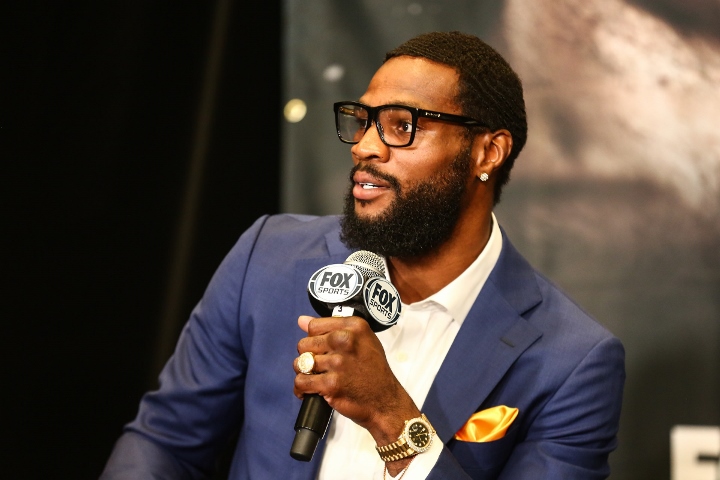The comeback was not televised.
A former U.S. Olympian and interim WBA light heavyweight champion, a fighter seen by most as one of the top 175-pound boxers in the world, Marcus Browne, was fighting on a Tuesday night in Los Angeles, far from his home in Staten Island and removed from the eyes of the boxing public.
Browne won that night in April, shutting out Denis Grachev over 10 rounds. Yes, the same Denis Grachev who went 1-5 in his previous six bouts and 0-3 since the loss to Browne.
It wasn’t Badou Jack, Jean Pascal, Lenin Castillo or Seanie Monaghan in the ring with him that night. Those were the names Browne was used to fighting. Grachev was a tune-up, maybe a confidence builder after the New Yorker’s lone loss to Pascal in August 2019.
He was 23-1 going to the fight with Grachev and 24-1 when it was over. Tune-up and confidence builder over, and after a year and change lost to the COVID-19 pandemic, Browne was back and in line for a fight against perhaps the most terrifying presence at 175 pounds, WBC and IBF champion Artur Beterbiev.
That fight takes place in Montreal this Friday, and Browne believes he will be back to the place in the pecking order where untelevised Tuesday night fights in LA are a thing of the past.
“I’m glad we got this opportunity,” he said during a recent media teleconference. “Come December 17 we’re gonna apply everything we’ve been working on. I’m focused, I’m ready, and I know he is; he always comes ready. I can’t wait to get in there, I can’t wait to fight.”
When Browne is on, he’s got the tools to beat anyone in the division. He proved it in his win over Jack in January 2019. Even when he lost to Pascal seven months later, his technical decision loss came by one point on each of the judges’ scorecards, despite being dropped three times. Today, Browne isn’t dwelling on the “1” in his loss column.
“This is boxing,” he said. “I was an elite amateur boxer, so wins and losses come. It’s how you bounce back and how you move forward from it. I didn’t harp on it too long; I didn’t think about it. I’m just focused on what’s in front of me.”
That means not even harping on Pascal testing positive for four banned substances leading up to a June bout with Jack that ended up being canceled.
“I don’t care about it,” Browne said. “It is what it is. It happened already. The loss is already on my record, there’s no excuse. I made mistakes that night anyway.”
By the time Browne beat Grachev, he had talked to his 2012 Olympic teammate Errol Spence about moving to Dallas and working with Spence’s coach Derrick James. And when Spence and James were in Las Vegas preparing for an August fight with Manny Pacquiao that got scrapped due to an eye injury suffered by the welterweight champ, Browne was already in Texas. So when James got back home, Browne was ready to work.
“To be successful, you have to make sacrifices, and you have to push yourself to be great and dare yourself to be great,” said James. “To get what you want you have to give up a lot. The biggest thing I see with Marcus is dedication. His focus and his desire to want to be better, to make a big difference and make a big change and move from Staten Island to Dallas is a big deal.”
It may also be the most important decision of his career – and his life. At 31, Browne is too old to be caught up in the nonsense that can happen when you’re a successful pro athlete and still around influences that can send you in the wrong direction. As he told me in 2016, “I come from Park Hill, Staten Island. That’s where Method Man and Raekwon and all those other guys came from, and if you listen to their music, they’ll tell you about what’s going on. There’s drugs all over the place, kids running around with guns, and it’s not easy. I’ve got two friends that just came home, one from doing eight years, the other doing ten. It’s not an easy road. A lot of people look at it as you’re an American, you’re spoiled, but I know where I came from and how I grew up, and it was never an easy road. It’s kind of crazy. You know those cards when you go to the funerals? They’re stacking up.”
And it hasn’t gotten better in New York City’s “forgotten borough,” so if Browne wants to get past Beterbiev, he needs complete focus. In Dallas, he’s getting that, because James knows what’s at stake.
“Beterbiev is a great fighter,” he said. “He’s a tough fighter, a rough and rugged fighter and a big puncher. It’s what we prepared for. You gotta go out there and do your best and be your best. This is the perfect fight for Marcus.”
Browne may need to fight the perfect fight to win this weekend, but if he does, he won’t be the forgotten man at 175 pounds anymore. He’ll be the one with the target on his back and the one in line for the big money bouts everyone always assumed he would be getting.
“I’m ready,” he said. “The Earth is my turf, so it doesn’t matter where the fight is. I’m ready to implement what we’ve been working on that night.”
Browne’s confidence reminds me of two other things he told me over the years, proving that he gets it. Not just in his sport, of which he said, “Boxing is a sport of truth,” but in life.
“Life is not a short trip,” Browne said. “This is a journey.”


ADD COMMENT VIEW COMMENTS (26)